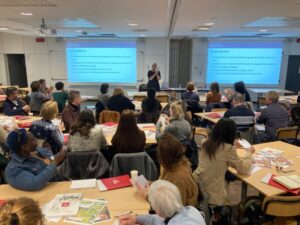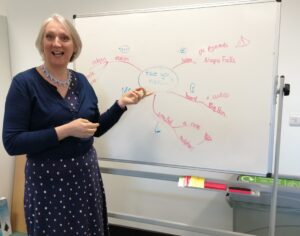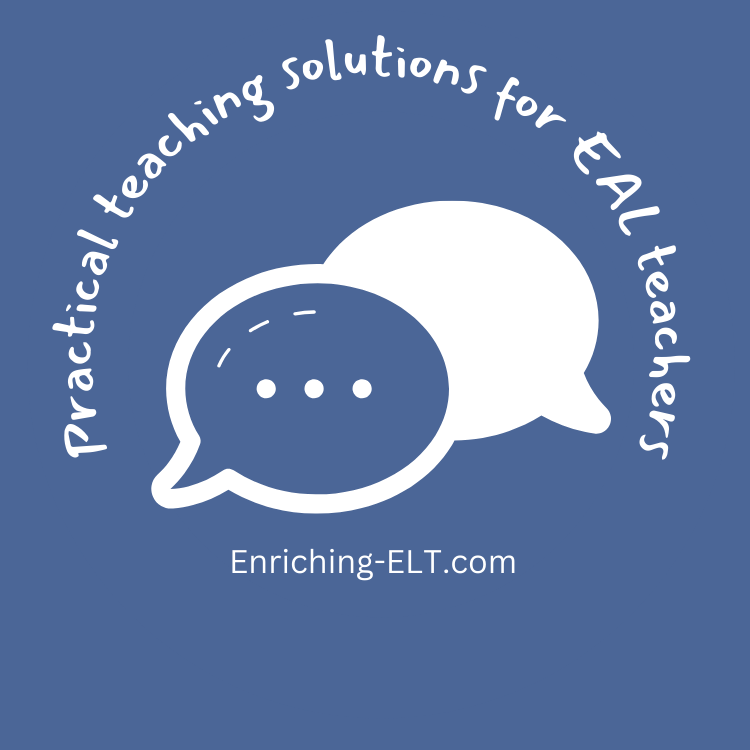Enriching EAL
You love teaching your subject, and you want every pupil to feel engaged and motivated, but you’re aware that all too often the EAL pupils are not getting as good an experience as they could or should be.

You’ve tried giving out translations, which helps them understand the content of the lesson, but that doesn’t actually help them improve their English. It can also remove them further from engaging in the lessons.
You speak English well, but you’re a subject teacher not an English teacher. You don’t feel you have the confidence to help pupils with the language they need to fully understand and get involved with your lessons.

At best, your EAL learners are under-performing, and at its worst, you end up with disengaged and disruptive students in the class. You know there is help for help outside classes, but you want to know how you can support them better in class.
This exciting new online course will launch later in 2025.
To register interest and find out more please complete the contact form below.
If you are interested in completing the pilot course in April 2025 please get in touch.
We are currently working with schools delivering the course with live webinars. If you are interested in participating, please get in touch.
If you are a subject teacher, and you are not sure what grammatical structures your EAL pupils need, I can help you.
If you are a classroom teacher and you realise that the only differentiation you are doing is giving EAL pupils a different worksheet, I can help you.
If you what to find out what more you can do to support your EAL learners, I can help you.

Lorem ipsum dolor sit amet, consectetur adipiscing elit. Ut elit tellus, luctus nec ullamcorper mattis, pulvinar dapibus leo.
The Objectives of the Enriching EAL Courses
- To present some essential background theories on how languages are acquired and the impact this can have in teaching practices. Having this knowledge directly impacts their ability to support their EAL learners as they will be able to create a more effective learning environment that goes beyond the subject being taught.
- To provide practical suggestions in making the content of the lessons more accessible and comprehensible to EAL learners. This helps reduce frustration and disengagement of some leaners whilst improving academic performance and motivation.
- To demonstrate how to identify the target language of a lesson. Teachers who can identify common challenges such as grammatical errors, limited vocabulary or difficulties in oral communication, can differentiate between language development issues and content comprehension problems. They can therefore structure and scaffold a lesson accordingly, or provide targeted interventions referring students for additional language support.
- To explore and reflect on practical teaching skills and techniques to support pupils becoming more efficient language learners. The tasks encourage the teachers to reflect on their own practices as well as the impact it has on their learners. Reflection can foster professional growth as the teachers become more knowledgeable and skilful in EAL pedagogy.
- To support teachers in identifying areas they can further develop by giving them personalised feedback on the tasks that they complete in the workbooks, helping them get the most out of the CPD sessions.

How the Enriching EAL Course is structured
The course is divided into 5 modules, the content of which is outlined above. The materials will be available for a maximum of 6 months, with the expectation that it is completed in 12 weeks.
- Each module comprises 4-5 input videos accessed online. If you are working as a group you can watch the videos and complete the tasks together, discussing the points as you watch. Each paying participant will have access to the videos to watch at a time that is suitable for them.
- There is an accompanying module workbook which includes implementation tasks, such as identifying key developmental opportunities in your classroom, and reflective exercises. The workbooks are designed to help teachers see the relationship between what is presented in the input videos and how it impacts their classroom environment.
- The completed workbooks are submitted for personalised, constructive feedback. This includes suggestions to try and implement as well as questions to investigate further.
- A discussion group to share and note progress in the participants’ teaching practice will be set up for each cohort.
- A live discussion forum will take place once a month via Zoom. This will be recorded and made available to active participants.
- A ‘Certificate of Completion’ will be issued to participants who have successfully submitted all of the workbooks.
The five ‘Modules’, which can be accessed online are:
- How Languages are Learned A look at language acquisition and what that means for planning content based/ subject themed lessons. This session provides participants with a basic lesson structure and check list to ensure there is a focus on both content and language in their lesson plan.
- Activating Learning Activities The issues of ‘How’ and What’ to activate to make learning more efficient is presented by way of loop input, leaving participants with lots of activities to experiment with in class. They will also gain knowledge of why activating learning is an essential step to the lesson.
- Making Instructions More Effective Communication is more than just words, and instructions for EAL learners need to be short and precise. This session explores how grading language and using supporting techniques can make a lesson much more successful.
- Looking at Vocabulary 1 Being able to identify essential word groups in a lesson, not only means teachers are more prepared for misunderstandings, they will be able to support the learners, this includes being able to use a variety of strategies to convey meaning. Participants will be engaged in practical tasks and exercises, both in the session and in their individual lessons/subjects.
- Looking at Language 1: Grammatical Structures It should be good practice to include a language focus in every lesson. This introductory session on identifying different structures should help teachers be able to integrate a grammatical focus into a lesson, demonstrating how to include activities that help support the learner move from controlled practise exercises to using the structure more fluently.
If you are looking for CPD to help support you with the EAL pupils you have in your class, then yes.
The course covers a variety of different aspects of teaching EAL pupils, but the focus is primarily on what you can do to become a better teacher in order for you to help your students become better language learners. It will give you a better understanding of what conditions language learners need, as well as supporting your own language awareness.
I know how busy teachers are, and that they have many, many, responsibilities to attend to. This is why I have made the course as flexible as I can. The videos are 5- 15 minutes long (although there are more than one for each module) so that you can grab a cup of coffee and watch one when you get the chance. The tasks are designed to help your teaching, so although you may have to think a little bit more when planning during the course, eventually it will happen more naturally and save you time (and stress!) in the long run.
The course is also designed to be flexible in how long it takes to complete. You might want to blast through it in a few weeks, or take your time. You have up to 6 months to complete the tasks if you want to get a certificate. (If you are on a closed course with your school, this would be negotiated with them)
Each module has around 45-60 mins of video time, and then there are implementation tasks and reflection task to complete too. It means looking back at lessons you have taught, and identifying areas that you would change if you were to do it again. You then need to make similar changes in your next few lessons and reflect on the effectiveness of these changes. It is suggested that you take your time to do these as you will get a lot more out of the course, and it will help you develop as a teacher.
There may be some areas that interest you more than others, and some which you need to work on more, so these may well take longer.
Absolutely, in fact it is better if you have the support of your school and other teachers you work with. If there is a group of teachers in your school who are interested, the course could be run as a closed group, with a discussion forum and group tutorials. Just ask your EAL coordinator/ principal to get in touch.
Yes. Again ask you head of department/ or EAL coordinator to get in touch to make arrangements.
There is also the possibility of having a bespoke course in order to meet the needs of the individual institution.
I have been an English language teacher and teacher trainer for 3 decades. As a CELTA (Cambridge Certificate in English Language Teaching to Adults) trainer I worked with many classroom teachers and subject teachers, and they have all said that they wished they had done the CELTA before they ever started teaching. Having over 1000 hours of observing teachers and providing detailed, constructive feedback means I know what works, and what you actually need. I have written many courses on Teaching English to Young Learners (TEYL) and have a Masters in TEYL too. Having a PGCE and experience in state schools, means I also know what pressures there are following a National Curriculum.
This course has been designed to provide you with exactly the information you need to support you and your EAL learners. There is a balance of theory and practical implementation. By the end of the course you will understand the rationale as to why something works in class (and why other things don’t). You will also have the experience of being able to identify areas you need to work on further.
This exciting new online course will launch later in 2025.
To register interest and find out more please complete the contact form below.
If you are interested in completing the pilot course in April 2025 please get in touch.
We are currently working with schools delivering the course with live webinars. If you are interested in participating, please get in touch.
